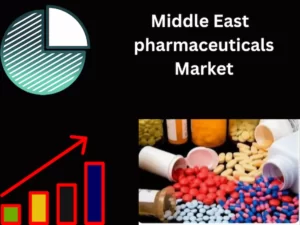© 2024 All rights reserved
Datavagyanik- Your Research Partner

Pharmaceuticals are an essential part of healthcare, and their popularity is growing globally, including in the Middle East. The growth of the pharmaceutical industry in the Middle East can be attributed to several factors, including an increase in population and life expectancy, the rise in chronic diseases, and the growing demand for better healthcare infrastructure.

The Middle East region has a large population, and with a rise in life expectancy, there is a growing need for healthcare services. With an increase in chronic diseases such as diabetes, cancer, and heart disease, there is a high demand for effective treatments, leading to the growth of the pharmaceutical industry in the region.
Governments in the Middle East are also investing heavily in the healthcare infrastructure, including building new hospitals and clinics and upgrading existing ones. This investment has led to an increase in access to healthcare services, further driving the demand for pharmaceuticals.
Moreover, the Middle East is home to a growing number of pharmaceutical companies that are expanding their presence in the region. These companies are investing in research and development to create new drugs to treat diseases prevalent in the region. This has resulted in the launch of several new drugs that cater to the specific needs of patients in the Middle East.
The region currently imports over 70% of its pharmaceuticals, with the majority of imports coming from Europe and North America.
The Middle East pharmaceutical industry consists of over 5,000 active manufacturers and distributors.
The region is estimated to have the highest rate of chronic and lifestyle diseases in the world, which is driving the demand for more pharmaceuticals.
The region is expected to experience rapid growth in the next few years due to increasing government investment in healthcare infrastructure and the development of innovative products.
The region has a high prevalence of counterfeit and substandard medicines, which are estimated to account for up to 15% of the total market.
The Middle East is a key hub for the development and marketing of generic medicines, with around 10% of the world’s generic drugs produced in the region.
The rise of medical tourism in the Middle East is another factor contributing to the growth of the pharmaceutical industry. Patients from all over the world are coming to the Middle East to receive medical treatment, leading to an increase in demand for pharmaceuticals.
In conclusion, the growth of the pharmaceutical industry in the Middle East can be attributed to several factors, including an increase in population and life expectancy, the rise in chronic diseases, government investment in healthcare infrastructure, the presence of pharmaceutical companies, and the rise of medical tourism.
Pharmaceuticals cover a wide range of medical treatments and medications that are used to prevent, treat, and manage illnesses and other conditions. These medications are available as pills, capsules, injectables, ointments, and liquids, among other forms.
Medications are created to treat particular illnesses and ailments that impact distinct human organs and systems. Pharmaceuticals are frequently used in the treatment of cardiovascular, oncological, diabetic, respiratory, neurologic, and other diseases. Depending on the particular ailment and intensity, each therapeutic area requires a separate set of medications and treatments.
Pharmaceuticals can be categorized into three main types: drugs, generic drugs, and biologics. Drugs are the original brand-name drugs that have been developed and patented by pharmaceutical companies. They are protected by patents for a certain period, after which generic versions of the drug can be produced and sold by other manufacturers. Generic drugs are identical copies of the original brand-name drugs, but they are sold at a lower cost. Biologics are pharmaceutical products made from living organisms or their products. They are used to treat a range of conditions, including cancer, autoimmune diseases, and infectious diseases.
The popularity of pharmaceuticals is growing in the Middle East due to a combination of factors. Firstly, the region is experiencing a rising burden of non-communicable diseases such as diabetes, cardiovascular disease, and cancer, which require long-term management and treatment. Secondly, the growing population and increased access to healthcare services are driving demand for pharmaceutical products. Finally, government initiatives to improve healthcare infrastructure and increase spending on healthcare are also contributing to the growth of the pharmaceutical industry in the region.
In summary, pharmaceuticals are a vital component of healthcare systems worldwide, including in the Middle East. The pharmaceutical industry in the region is growing rapidly, driven by a combination of factors such as rising disease burden, growing population, increased healthcare access, and government support.
The pharmaceutical market in Saudi Arabia is growing due to the Saudi government’s commitment to investing in the country’s healthcare system. The government has increased the budget for healthcare and medical research, which has enabled the country to access more advanced medical technologies and treatments. Furthermore, the Saudi government has implemented several reforms, such as the Saudi Food and Drugs Authority (SFDA) and the Saudi Central Board of Accreditation for Healthcare Institutions (SCBAHI). These reforms have improved the quality of healthcare in the country, making it more attractive for people to seek medical services in the country. Additionally, the country has attracted foreign investments in the pharmaceutical sector, which has further contributed to the growth of the industry in the region.
The pharmaceutical market in the United Arab Emirates is growing due to the country’s dedication to developing its healthcare sector. The government has implemented numerous initiatives to improve the quality of healthcare, such as the introduction of universal healthcare coverage, the establishment of a comprehensive healthcare regulatory framework, and the development of a digital healthcare system. Furthermore, the country has attracted significant foreign investments in the pharmaceutical sector, which has enabled the industry to expand and develop. Additionally, the UAE has a strategic location near other markets, such as India and Africa, which has made it a hub for pharmaceuticals, allowing the industry to benefit from the availability of a wide range of products and services.
The middle east Baby Care Products market has been segmented By Therapeutic area and By Product Type.
Based on the By Therapeutic area, the middle east is cardiovascular, oncology, diabetes, respiratory, neurology, and others. In 2021, cardiovascular diagnostics held a significant share. These diagnostics are used to detect and diagnose diseases related to the heart and blood vessels. This includes diseases like hypertension, heart failure, and coronary artery disease. The market for cardiovascular diagnostics is expected to grow significantly in the coming years. To further enhance this growth, the introduction of cutting-edge technologies and improved treatment options has been instrumental. For instance, the introduction of artificial intelligence-based imaging technologies has enabled the detection of diseases at earlier stages, thereby increasing cardiovascular diagnostic use.
Based on the By Product Type, the middle east is branded drugs, generic drugs, and biologics. In 2021, the generic drugs segment held a significant share. Generics are cost-effective alternatives to branded drugs and are expected to grow in market share in the coming years. This is due to the increasing demand for generic drugs, as well as their availability on the market. This has resulted in an accelerated rate of generic drugs being introduced to the market. As a result, the generic drugs segment is likely to experience substantial growth in the years to come, with an increasing number of generic drugs being available at more affordable prices. For example, the new study estimates the total savings accrued during the 12 months following each generic drug approval in 2018, 2019, and 2020.
By Therapeutic area
By Product Type
By Region
“Every Organization is different and so are their requirements”- Datavagyanik







© 2024 All rights reserved
Datavagyanik- Your Research Partner
Add the power of Impeccable research, become a DV client